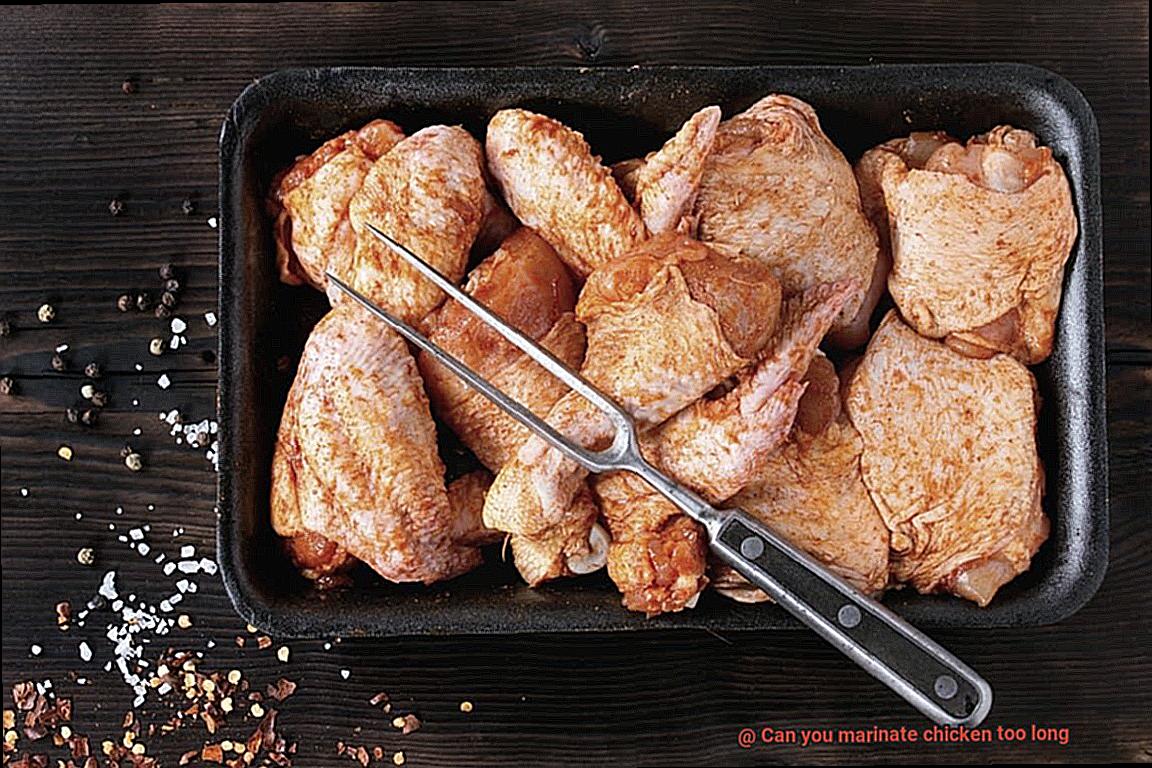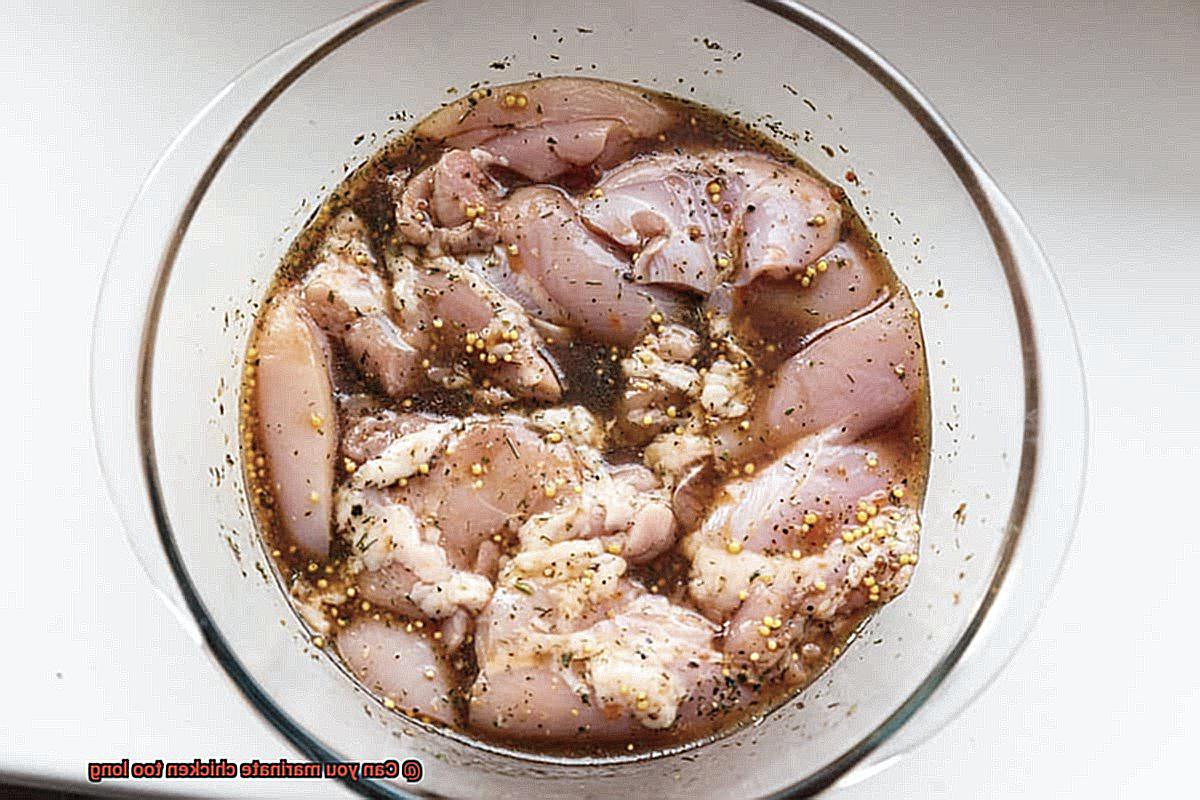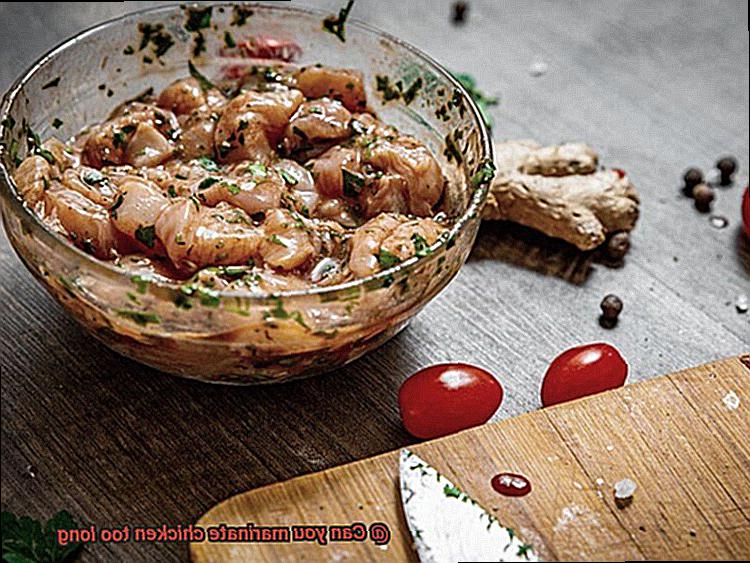Marinating your chicken is a surefire way to achieve that mouthwatering taste and texture. But what happens when you leave your chicken in the marinade for too long?
Imagine this scenario: You’ve whipped up your go-to marinade recipe and left your chicken to soak overnight. The next day, life gets in the way and before you know it, two days have passed. Now you’re wondering if it’s still safe to consume.
Well, the answer is yes and no. Yes, you can marinate chicken for too long, but it’s not just about the quality of the meat. There are chemical reactions between the marinade and chicken that can affect its texture and flavor profile. While under-marinated chicken can be lackluster in taste, over-marinated chicken can turn tough and sour.
In this article, we’ll delve into the science behind marinating chicken, how to determine the optimal time frame for marination, and what to do if you’ve accidentally let your chicken sit in the marinade for too long. Whether you’re an amateur cook or a seasoned pro, this guide will help perfect your chicken game. Don’t miss out on these essential tips.

Contents
How Long Can You Marinate Chicken For?
Marinating chicken is a culinary technique that can take your poultry from bland to delicious in no time. But how long should you marinate your chicken for? As an expert in this field, I’m here to tell you that it all depends on the type of marinade and cut of chicken being used.
While marinating chicken can greatly enhance its flavor and texture, it’s important not to overdo it. Over-marinating can cause the meat to become mushy and even tough, ruining your dish entirely. So, let’s explore the ins and outs of marinating chicken.
First and foremost, the length of time you marinate chicken can greatly affect its taste and texture. If you’re using a highly acidic marinade, such as one containing vinegar or citrus juice, it’s best to keep the marinade time shorter, around 2-4 hours. This is because the acid in the marinade can denature the proteins in the chicken, which can result in a less desirable texture.
Conversely, if you’re using a milder marinade that contains little to no acid, you can marinate for up to 24 hours. This will allow the flavors to penetrate the meat without doing any damage. It’s essential to note that certain cuts of chicken are more delicate than others and can break down faster in a marinade. For instance, chicken breasts should only be marinated for up to 2 hours, while tougher cuts like thighs or drumsticks can handle a longer marinade time.
To summarize, here are some key takeaways:
- Marinate chicken for at least 30 minutes to a maximum of 24 hours.
- Stick to recommended marinating times based on the type of marinade and cut of chicken being used.
- Highly acidic marinades should have shorter marinating times (2-4 hours).
- Milder marinades can be left for up to 24 hours.
- Delicate cuts like chicken breasts should only be marinated for up to 2 hours, while tougher cuts like thighs or drumsticks can handle a longer marinade time.

The Effects of Over-Marinating Chicken
As someone who has spent many years in the kitchen, I am excited to share with you some fascinating facts about the effects of over-marinating chicken.

One of the most significant consequences of over-marinating chicken is the impact it has on the texture of the meat. When the chicken is marinated for too long, the acid present in the marinade can break down the proteins, resulting in a mushy texture that ruins the overall eating experience. Nobody wants to sink their teeth into a piece of chicken that feels like they’re chewing on baby food.
But that’s not all – over-marinating can also have a detrimental effect on the flavor of your chicken. Marinades are meant to enhance the taste of your dish, but when they’re left on for too long, the flavors can become overpowering and mask the natural taste of the chicken. This means that all that effort you put into marinating your meat can go to waste.
So, what can you do to prevent this from happening? Firstly, it’s crucial to follow marinating guidelines closely. The length of time required for marinating chicken varies depending on factors like the type of marinade and cut of chicken used. For instance, highly acidic marinades containing vinegar or citrus juice should not be used for more than 2-3 hours on thin cuts like breasts or thighs. In contrast, milder marinades containing herbs and spices can be used for up to 24 hours on thicker cuts like whole chickens or drumsticks.

Additionally, it’s always better to err on the side of caution and opt for a shorter marinating time if you’re unsure about how long to marinate your chicken. This way, you’ll still get all the benefits of a well-seasoned dish without compromising its texture and taste.
What Are the Risks of Marinating Chicken Too Long?
Over-marinating your chicken can lead to serious risks that can affect both its taste and safety.
The first risk involved in over-marinating chicken is bacterial growth. When left at room temperature, the bacteria present on the raw meat can multiply rapidly and reach dangerous levels, leading to foodborne illnesses. To avoid such risks, always refrigerate your marinated chicken and cook it thoroughly before consumption.
But that’s not all. Over-marinating chicken can turn it into a mushy, unappetizing mess. The acids in the marinade break down the proteins in the meat, causing it to lose its texture and structure. So, no matter how flavorful your marinade may be, over-marinating may ruin your dish.
Over-marinating can also overpower the natural flavor of chicken, making it too salty or sour. This defeats the purpose of marinating and results in an unenjoyable meal.
To avoid these risks and enjoy a deliciously marinated chicken meal, it’s best to stick to recommended marinating times – usually no more than 24 hours in the refrigerator. This will ensure that your chicken stays safe to eat, retains its texture and structure, and doesn’t overpower its natural flavor.
What Is the Recommended Time to Marinate Chicken?
Elevate your dishes with marinated chicken. But how long should you marinate it to get the perfect flavor and texture? As an expert on the subject, let me guide you through the recommended time to marinate chicken.
The ideal marinating time can vary depending on the type of marinade and the cut of chicken being used. It is generally recommended to marinate chicken for a minimum of 30 minutes to 2 hours in the refrigerator. This allows the flavors of the marinade to seep into the meat without over-tenderizing or breaking down the proteins in the chicken.
For tough cuts such as chicken thighs or drumsticks, marinating for up to 24 hours can be beneficial as it helps to tenderize the meat. However, exceeding this time frame can lead to a mushy texture due to the acidity in some marinades breaking down the proteins too much.
On the other hand, delicate cuts like chicken breasts should not be marinated for more than 2 hours as they are more prone to becoming mushy or rubbery if over-marinated. If using an acidic marinade like one with citrus juice or vinegar, a shorter marinating time is recommended to avoid over-tenderizing.

Remember, it is crucial to follow the recommended marinating times for your specific recipe and cut of chicken. To find your perfect balance between flavor and texture, experiment with different marinades and time frames.
Does Marinating Tenderize Meat?
Let’s dive into the science behind marinades. A typical marinade consists of an acidic component like vinegar or citrus juice, oil, and various herbs and spices. The acid in the marinade can break down some of the proteins in the meat, which can help tenderize it. However, this process only occurs on the surface of the meat. If you leave your meat in the marinade for too long, the acid can actually toughen the meat and make it tough to chew.
So what should you do to ensure your meat is both flavorful and tender? It all depends on several factors, such as the type and thickness of the cut of meat as well as the acidity level of the marinade. For example, chicken breasts may only need 30 minutes to an hour of marination time, while thicker cuts like flank steak may require overnight marination.
But keep in mind that marinating alone may not always be enough to tenderize tough cuts of meat. In some cases, additional methods like pounding or braising may be necessary to fully break down those tough fibers in the meat.
Here are some key takeaways:
- Marinating can add flavor to your meat but may not always tenderize it.
- The length of time that meat should be marinated depends on several factors such as thickness and acidity level.
- Leaving meat in a marinade for too long can toughen it up.
- Additional methods like pounding or braising may be necessary to fully tenderize tough cuts of meat.

Alternatives to Marinating for Tenderizing Meat
There are plenty of alternatives to marinating that can help to tenderize your meat and add delicious flavor. As an expert in the field, I have gathered some research notes to share with you. So, let’s dive into these tantalizing techniques.
Firstly, using a meat mallet or tenderizer tool can be a game-changer. This may sound like a Herculean task, but it’s easy and effective. Simply pound the meat to break down the muscle fibers and create a more tender texture. Not only does this technique work well for chicken, but it’s also great for beef, pork, and even lamb.
If you’re looking for an option that packs a punch in terms of flavor, try using a dry rub. A blend of spices and herbs rubbed onto the surface of the meat before cooking can add an explosion of flavor while also tenderizing the meat. You can experiment with different herbs and spices to find your perfect blend.
For those who prefer an acidic alternative, vinegar or citrus juice can be used to tenderize the meat without having to marinate it for too long. Simply drizzle or spray the acid over the surface of the chicken before cooking, making sure not to go overboard as too much acid can start to cook the meat.
Brining is another effective technique that involves soaking the chicken in a mixture of water, salt, and sugar for several hours before cooking. The salt helps break down the muscle fibers while the sugar adds flavor and helps retain moisture. This results in a succulent and juicy finished product that will leave your taste buds dancing.
Lastly, consider cooking methods that naturally tenderize meat, such as slow-cooking or braising. These methods involve cooking the chicken at a low temperature for an extended period of time, allowing the connective tissue to break down and result in a melt-in-your-mouth tender finished product.
Tips for Safely Marinating Chicken
Marinating chicken is a popular technique used by many cooks to enhance the flavor and texture of their chicken dishes. However, it’s important to remember that raw chicken can carry harmful bacteria like salmonella or E. coli, which can cause foodborne illnesses. Therefore, it’s crucial to follow food safety guidelines when marinating chicken. Here are five sub-sections that highlight the importance of safe marination:
The Importance of Using a Food-Safe Container
When choosing a container for marinating chicken, always use food-safe materials like glass, stainless steel, or food-grade plastic. Avoid using materials that can absorb bacteria, such as wood or porous plastic. Using a designated container for marinating chicken reduces the risk of cross-contamination and keeps harmful bacteria away from other foods.
The Significance of Refrigeration
Marinate chicken in the refrigerator at 40°F or below to prevent bacterial growth. Always store the chicken in a covered container and avoid leaving it on the counter or outside. Bacteria grow rapidly at room temperature, so keeping the chicken chilled is critical in ensuring its safety.
The Role of Marinating Times
Follow recipe instructions for marinating time to avoid over-marinating your chicken. Over-marinating can make the meat tough and dry, as the acid in the marinade breaks down the proteins in the chicken. As a general rule, marinate your chicken for no more than 24 hours.
The Dangers of Reusing Marinade
Never reuse marinade that has been in contact with raw chicken as this can lead to cross-contamination and spread harmful bacteria onto other foods. Discard any leftover marinade or boil it for at least 5 minutes before using it as a sauce.
The Importance of Using a Food Thermometer
Using a food thermometer is essential in ensuring that your chicken is fully cooked and safe to eat. The recommended temperature for cooked chicken is 165°F. Even if the chicken looks fully cooked, it may not be safe to eat without reaching this temperature.
wyB55Y4t7tE” >
Conclusion
In conclusion, marinating chicken is a culinary technique that can elevate your dishes to the next level. However, like any cooking method, there are certain guidelines to follow to ensure success. Over-marinating chicken can result in tough, sour meat that nobody wants to eat.
The key to achieving perfectly marinated chicken is knowing the optimal marinating time for your chosen cut and marinade. For highly acidic marinades, such as those containing vinegar or citrus juice, shorter marinating times of 2-4 hours are recommended. Milder marinades can be left for up to 24 hours but should still be monitored closely.
It’s important to note that delicate cuts like chicken breasts require shorter marinating times of up to 2 hours, while tougher cuts like thighs or drumsticks can handle longer marination periods. However, over-marinated chicken poses several risks such as bacterial growth and overpowering flavors that ruin the dish.
If you’re looking for alternatives to marination for tenderizing meat, consider using a meat mallet or tenderizer tool, dry rubs, vinegar or citrus juice drizzles, brining, or slow-cooking methods.
When it comes to food safety during the marination process, always use food-safe containers and refrigerate at 40°F or below. Follow recommended marinating times and avoid reusing marinade that has been in contact with raw chicken. Using a food thermometer when cooking is also crucial for ensuring safe consumption.






